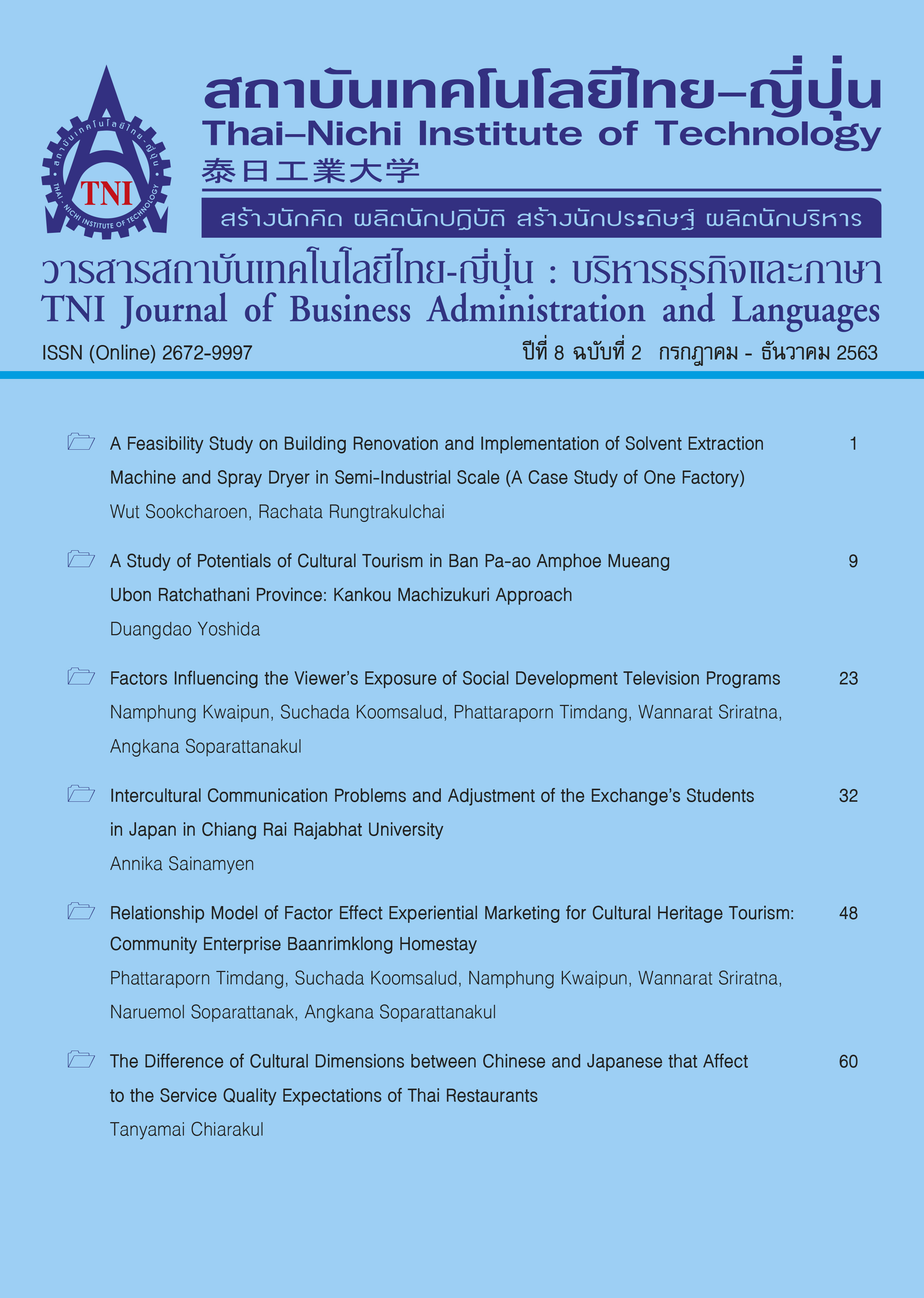Intercultural Communication Problems and Adjustment of the Exchange’s Students in Japan in Chiang Rai Rajabhat University
Main Article Content
Abstract
The purpose of this research aimed to study intercultural communication problems and adjustment of the exchange’s students in Japan in Chiang Rai Rajabhat University. The result of this research shows that problems of intercultural communication and adjustment methods of exchange students in Japan are caused by 1) Understanding problems in language and culture which adjusted by learning by oneself. 2) Attitude problems from thinking but adjusted by starting from changing the perspective and unattached their own culture and accept the new culture. 3) Behavioral problems from trying to avoid meeting strangers by accepting new friends for the opportunity to gain new experiences in life.
Article Details
Article Accepting Policy
The editorial board of Thai-Nichi Institute of Technology is pleased to receive articles from lecturers and experts in the fields of business administration, languages, engineering and technology written in Thai or English. The academic work submitted for publication must not be published in any other publication before and must not be under consideration of other journal submissions. Therefore, those interested in participating in the dissemination of work and knowledge can submit their article to the editorial board for further submission to the screening committee to consider publishing in the journal. The articles that can be published include solely research articles. Interested persons can prepare their articles by reviewing recommendations for article authors.
Copyright infringement is solely the responsibility of the author(s) of the article. Articles that have been published must be screened and reviewed for quality from qualified experts approved by the editorial board.
The text that appears within each article published in this research journal is a personal opinion of each author, nothing related to Thai-Nichi Institute of Technology, and other faculty members in the institution in any way. Responsibilities and accuracy for the content of each article are owned by each author. If there is any mistake, each author will be responsible for his/her own article(s).
The editorial board reserves the right not to bring any content, views or comments of articles in the Journal of Thai-Nichi Institute of Technology to publish before receiving permission from the authorized author(s) in writing. The published work is the copyright of the Journal of Thai-Nichi Institute of Technology.
References
Busayagorn Teeraputtigunchai. (2018). Communication problems and cross-cultural adjustment of foreigners working in educational iInstitutions, Phetchabun Province. (in Thai). Journal of Humanities and Social Sciences, 26(50), 189-212.
Gudykunst, W. B., & Kim, Y. Y. (2003). Communicating with strangers: An approach to intercultural communication. (4th ed.). New York: McGraw-Hill.
Metta Vivatananukul. (2005). Intercultural communication. (in Thai). Bangkok: Chulalongkorn University Press.
Metta Vivatananukul. (2016). Intercultural communication. (in Thai). (2nd ed.). Bangkok: Chulalongkorn University Press.
Ministry of Education, Culture, Sports, Science and Technology-Japan. (2019). Survey on the enrollment status of foreign students and Number of Japanese students studying abroad. Retrieved from http://www.mext.go.jp/a_menu/koutou/ryugaku/__icsFiles/afieldfile/2019/01/18/1412692_1.pdf.
Nishida Hiroko. (2008). Intercultural communication in a globalized world. Tokyo: Taihei Printing Co., Ltd.
Patcharapa Euamornvanich. (2017). Intercultural communication problems and adjustment between foreign instructors and Thai students at Rajabhat Universities in Bangkok. (in Thai). Dhonburi Rajabhat University Journal, 10(2), 79-92.
Sahattaya Sittivised, Simmee Oupra, Somyos Chanborn, Annika Taboonruang, Suriya Kasetsuthavorn, Lisec, Albert,...Pinsheng, Zhou. (2017). Cross-cultural communication between Chinese and Thai people in the special economic border zone: Problems and sustainable solution guidelines. School of Social Sciences Chiang Rai Rajabhat University, (in Thai). 10(Special), 133-144.
Suttiwan Tuntirojanawong. (2017). A direction of educational management in the 21st century. (in Thai). Veridian E-Journal, Silpakorn University, 10(2), 2843-2854.
Thatcha Wittayawirot. (2009). Communication competence and acculturation of foreigners living in Bangkok (in Thai). (Master's thesis, Bangkok University). Retrieved from http://dspace.bu.ac.th/handle/123456789/686
Ting-Toomey, Stella, and Chung, Leeva C. (2012). Understanding intercultural communication. (2nd ed). New York: Oxford University Press.
Vicharn Panich. (2013). Teacher for disciples flapped classroom. (in Thai). Bangkok: S.R. Printing.
Zahraulnan Phumchijzarnan. (2016). COMUNICACIÓN INTERCULTURAL ENTRE ALUMNOS TAILANDESES Y PROFESORES ESPAÑOLES EN LA CLASE DE ESPAÑOL EN TAILANDIA (in Thai). (Master's thesis, Chulalongkorn University). Retrieved from http://cuir.car.chula.ac.th/dspace/bitstream/123456789/59303/1/5780211222.pdf


